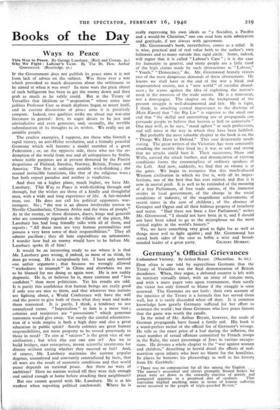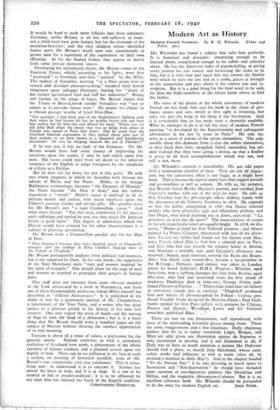Germany's Official Grievances
Unfinished Victory. By Arthur Bryant. (Macmillan 8s. 6d.)
How often is one told by supercilious Germans that the Treaty of Versailles was the final demonstration of British decadence. When, they argue, a defeated country is left with its territory virtually intact, with an army of too,000 men, and with a mere paper veto upon rearmament, then surely the victor has only himself to blame if the struggle is soon renewed. The Germans are not fools : their own account of the injustice of the Treaty is a formula that has served them well, but it is easily discarded when off duty. It is common knowledge how greatly Germany suffered for her effort to overturn the world ; but those Germans who love peace lament that the game was worth the candle.
In the mind of Mr. Arthur Bryant, however, the seeds of German propaganda have found a fertile soil. His book is a word-perfect recital of the official list of Germany's wrongs. He tells us the exact price of a loaf during the inflation, the exact number of sexual offences committed by French troops in the Ruhr, the exact percentage of Jews in various occupa- tions. He devotes a whole chapter to the " war against women and children," describing in horrid detail the effects of mal- nutrition upon infants who bore no blame for the hostilities. In places he borrows his phraseology as well as his history from Dr. Goebbels:
" There was no compunction for all this among the English.. . . The enemy's occasional and always promptly flouted feelers for peace were set down as the cowardly reaction of greedy and pampered appetites to a perpetual diet of sardines. That starvation implied anything more in terms of human suffering never occurred to the people of triple-guarded Britain." It would be hard to pack more fallacies into three sentences. Germany, unlike Britain, is all but self-sufficient in food : not a child need have gone hungry but for the demands of the
munition-factories : and the very children whose shrivelled bodies move Mr. Bryant's wrath now vote unanimously as grown men for a repetition of the experiment on their own offspring. As for the flouted feelers, they appear to derive from some private historical source.
Developing his stereotyped theme, Mr. Bryant comes to the Fourteen Points, which, according to his lights, were first " promised " to Germany and then " ignored " by the Allies. The makers of Versailles, meeting " in a Paris given over to cynical and dissolute pleasure-seeking," wreaked their horrid vengeance upon unhappy Germany, leaving her " shorn of
her richest agricultural land and half her industries." Rising still further on the wings of fancy, Mr. Bryant claims that the Treaty of Brest-Litovsk (unlike Versailles) was " not so unjust as to provoke future wars." He attains his climax in a vibrant passage worthy of Lord Haw-Haw: " For centuries it had been part of the Englishman's fighting code that, when he had beaten his foe, he neither feared him nor bore him malice but let him rise and offered his hand. Where was .he old John Bull when the treaty that was to bring back peace to Europe was signed in Paris that June? Did he stand over the wretched German signatories as they pulled cheap pens out of their pockets to set their names to a shameful and humiliating document? Or was he sleeping beneath the soil of Flanders?"
If he was not, it was no fault of the Germans. Yet Mr.
Bryant would have had some chance of impressing his emotions upon the reader, if only he had ended upon that note. His views could have been set down to the inherent tendency of the English to judge foreigners by the standards of a Grey or a Halifax.
But he does not lay down his pen at this point. He adds two whole chapters, in which he describes with fervour the advent of Hitler and the Nazis. Hitler, in his strange Baldwinese terminology, becomes " the Dreamer of Munich," the Nazis become " the Men of Iron," and the rubber truncheon a " sword." Hitler's career is outlined in all its delicate beauty and pathos, with much emphasis upon the Fares courage, loyalty and artistic gifts. His speeches have for Mr. Bryant's ears " a rude Cromwellian vigour." And what more fitting? " For this man, embittered by his intense early sufferings and steeled by war, was that which Dr. Johnson loved—a good hater." The degree of admiration which the Doctor would have evinced for his other characteristics is a subject of pleasing speculation.
Mr. Bryant finds a Cromwellian parallel also for his Men of Iron : " They destroyed because they were shocked, much as Cromwell's troopers slew the trollops in King Charles's baggage lines or the Papists at Drogheda."
Mr. Bryant perfunctorily deplores their political bad manners, but is not surprised by them. In his own words, the supporters of the Nazi Movement were " men and women inspired by the spirit of evangels." One should allow for the urge of men and women so inspired to propagate their gospels in foreign parts.
This stuff does not emanate from some obscure member of the Link intoxicated by a week at Nuremberg, nor from one of those Germanophile professors whom Hitler himself has .described as " folklore Ahasueruses." It is published in the midst of war by a prominent admirer of Mr. Chamberlain, a functionary of the Tory Party, and a writer who has done justice to a glorious period in the history of his own free country. One may expect the noise of bands and the waving of flags to turn the head of a debutante ; but it is a sorry thing that Mr. Bryant should write a hundred pages on the subject of Nazism without showing the smallest appreciation of its real meaning.
Toryism is above all a sense of values, a preference for the genuine article. Nazism confronts us with a systematic
exaltation of falsehood over truth, a debasement of the whole currency of human conduct, and a planned assault upon the dignity of man. There can be no palliation in the face of such a system, no drawing of historical parallels, none of Mr. Bryant's tout comprendre c'est tout pardonner. This is some-
thing new: to understand it is to execrate it. Science has armed the beast in man, and it is at large. It is not to be stroked or fed or psycho-analysed ; it is to be abhorred by any man who has enjoyed the fruits of the English tradition.
CHRISTOPHER HOBHOUSE.







































 Previous page
Previous page